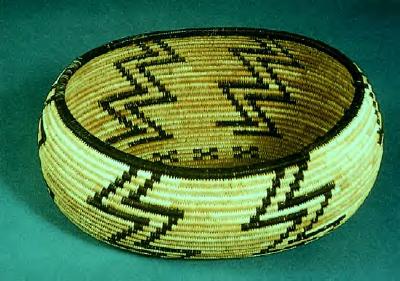|
|
Canku Ota |
|
|
(Many Paths) |
||
|
An Online Newsletter Celebrating Native America |
||
|
February 10, 2001 - Issue 29 |
||
|
|
||
|
Miwok Author Credit Elders |
||
|
by Miriam Silver The Press Democrat |
||
|
Basket by Mabel McKay |
 Greg
Sarris says tribal 'dreamer' gave him a sense of ancient culture. Greg
Sarris says tribal 'dreamer' gave him a sense of ancient culture.Surrounded by historical scenes at the Sonoma County Museum, Coast Miwok tribal chairman Greg Sarris talked about the importance of remembering. He quoted from Essie Parish, a basket maker and the late spiritual leader of the Sonoma County Pomos. "Essie Parish said, 'Toward the end of the world, when I am no longer here ... it's important people remember and respect.' Memory is so important, for people to remember these things," Sarris said. An author and UCLA English professor, Sarris was the headline speaker Saturday at a Native American history event at the museum. About two dozen people listened to his talk and watched a food demonstration by Kathleen Smith, who cooked a meal of seaweed, toasted bay nuts wrapped in watercress, and manzanita cider. A Santa Rosa native, Sarris wrote "Watermelon Nights" and "Grand Avenue." For the past eight years, he has been rallying the 407 members of his small tribe to regain federal recognition. That was accomplished at the end of December, when President Clinton signed a measure that gave the tribe a new name, Federated Indians of Graton Rancheria, as well as money to open an office. Sarris has said the Coast Miwoks do not intend to start a casino. "Many of our people are poor. There is a legacy of poverty and displacement. Now we have the opportunity to reclaim our land, our souls and our well-being. I hope we can institute culture and respect for each other," Sarris said. A screenwriter as well as a novelist, Sarris uses Sonoma County as the setting for his fiction, focusing on Native American ancestors he came to know about when he was in his teens. He learned from elders, in particular from basket maker and tribal "dreamer" Mabel McKay, whose biography he wrote. "Indian women run the show ... the chief always took direction from the dreamer. Mabel McKay, with Essie Parrish, was the last of the old-time dreamers," Sarris said. He told of driving McKay up the coast one foggy night. As he complained and worried about the hazardous drive, she sang a fog song, and the road cleared. "The fog opened up. It was a tunnel. I swear to you," Sarris said. "Mabel said, 'I guess the song worked.' She always reminded me there was a world bigger than myself. She gave me a sense of the ancient culture around here." |
|
Coastal Miwok |
|
California Indian Basket Weaver's Association |
|
|
||
|
|
||
| Canku Ota is a free Newsletter celebrating Native America, its traditions and accomplishments . We do not provide subscriber or visitor names to anyone. Some articles presented in Canku Ota may contain copyright material. We have received appropriate permissions for republishing any articles. Material appearing here is distributed without profit or monetary gain to those who have expressed an interest. This is in accordance with Title 17 U.S.C. section 107. | ||
|
Canku Ota is a copyright © 2000, 2001 of Vicki Lockard and Paul Barry. |
||
|
|
The "Canku Ota - A Newsletter Celebrating Native America" web site and its design is the |
|
|
Copyright © 1999, 2000, 2001 of Paul C. Barry. |
||
|
All Rights Reserved. |
